Historic Town Meeting Declares Brookline, Mass. a "Kids' Safe Zone," May 26, 2005
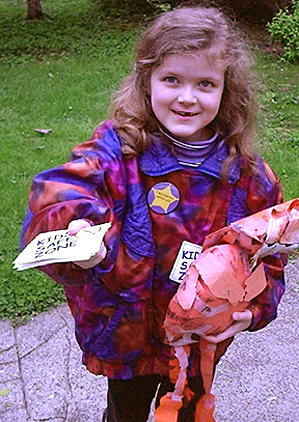
Brave little volunteer distributes KIDS' SAFE ZONE stickers at Brookline Town Meeting.
Town vote takes aim at spanking -- Brookline policy frowns on practice
Spanking will no longer be tolerated in Brookline.
That was the message sent last night by town residents, who, after two previous failed votes, passed a nonbinding resolution that makes it local policy to discourage parents and child-care workers from using corporal punishment.
Supporters of the resolution said Brookline is the nation's first municipality to take such a position...Read the whole story
By David Abel, Globe Staff
Boston Globe, May 27, 2005
Paddling at school, abuse at home - Texas ranks high in both categories. What to do? Jimmy Dunne has the solution.
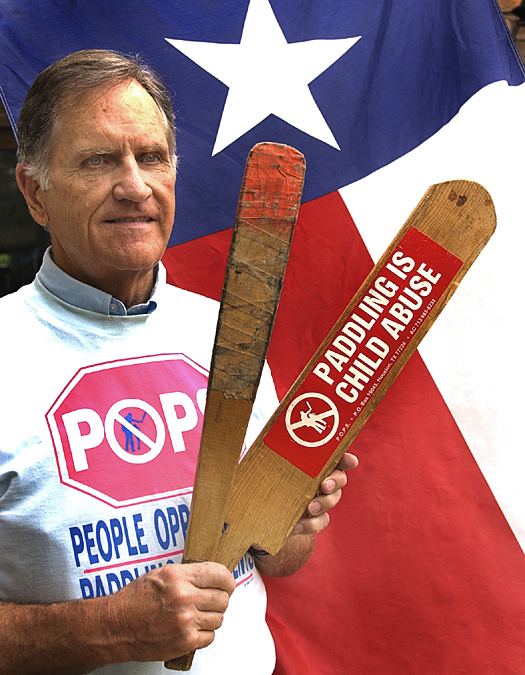
Jimmy Dunne, Founder and President
of People Opposed to Paddling Students (POPS)
We will have taken the first step toward reducing the shameful number of child abuse-related fatalities in Texas when we stop paddling in Texas schools.
Since I first spoke out against corporal punishment in the schools in January, 1981, calling it legalized child abuse, I have learned a great deal about the issue. People learn how to behave from their role models. When parents curse, children learn to cuss, when parents yell, children learn to yell and when parents hit, slap or spank, children learn to hit.
The same thing happens when the schools are swinging paddles on their students. Parents pick up on that and feel that it is OK to whip their children at home with belts, paddles or extension cords. We end up with more battered and dead children.
School paddling is legalized child abuse. Twenty-eight states have banned this brutal and abusive practice. Hitting children with boards is wrong.
It not only hurts children at school, it promotes more child abuse at home. 204 Texas children died from abuse or neglect in the past fiscal year, up 11% from the previous year and double the number from a decade earlier, according to the state Dept. of Family and Protective Services. The 2004 fatality rate, 3.3 for every 100,000 Texas children is roughly 65% higher than the national average of 1.98 per 100,000 children as certified by the federal Dept. of Health and Human Services.
Nearly one in every five of the 204 deaths in the past fiscal year which ended Aug. 31, occurred in Harris County. In fiscal 2003, Texas had 184 child fatalities related to abuse or neglect, according to Family and Protective Services. In 1994, it was 102.
Texas schools paddled almost 74,000 children in 2000, 23% of the kids paddled that year in the U.S. Paddling is more of a reflection on the teacher than on the student. Most good teachers never paddle their students while a man down the hall may be paddling children several times each week. This goes on from kindergarten through high school. Male teachers paddling female junior high and high school girls are often getting a sexual turn-on. Children end up with badly bruised buttocks.
Abolition is supported by the American Medical Assn., the National Bar Assn., the National Education Assn., the American Academy of Pediatrics, and the Texas Elementary Principals and Supervisors Association.
With Texas child abuse rates higher than the national average, we cannot logically tackle the problem until we put away the paddles in our schools. The good news is that Rep. Dr. Alma Allen, a former Houston school principal is the sponsor of HB 2413 which will abolish corporal punishment in Texas public schools. We all need to get behind this bill.
Jimmy Dunne , April 12, 2005
Contact Jimmy at:
See photo of Texas student with paddle-related injury.
People Opposed to Paddling Students or POPS
1306 W. Brooklake
Houston, TX 77077
Tel: 281-584-9707
E-mail jimmydunne@sbcglobal.net
Web site www.nospankingzone.org

DR. TARIQ RAMADAN
World-renowned Islamic scholar
We are officially launching today an international call for an immediate moratorium on corporal punishment, stoning and the death penalty in all majority Muslim countries, says Dr. Ramadan.
Read "Ramadan calls for a moratorium on corporal punishment," The Muslim News, March 30, 2005

Peggy Dean leads the way!
Union County, North Carolina mom/R.N. wages a relentless campaign to ban school paddling.
Support for the reform escalates. Dean: "I want a safe, orderly, caring environment... Educators need to take the high road and decide violence in any form is a tool that will not be used."
See related articles under NORTH CAROLINA
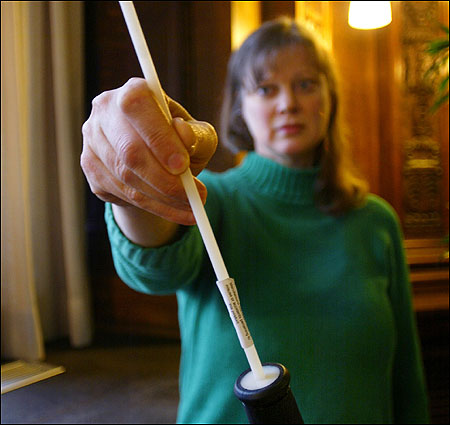
Susan Lawrence is pressing US authorities to ban sales of The Rod, a $5 whipping tool. (Globe Staff Photo / John Tlumacki)
Sale of spanking tool points up larger issue
By Patricia Wen, Staff, Boston Globe, January 10, 2005
ARLINGTON -- On a spring day, Susan Lawrence was flipping through a magazine, Home School Digest, when she came across an advertisement that took her breath away. In it, ''The Rod," a $5 flexible whipping stick, was described as the ''ideal tool for child training."...
=> Read the entire Boston Globe article, and correspondence about "The Rod" between Dr. Teresa Whitehurst and the U.S. Consumer Product Safety Commission, at
www.nospank.net/n-n84r.htm.

Senator Céline Hervieux-Payette
Ottawa, Canada, December 2, 2004
"[Spanking is] not a means of education, it is a means of coercion that in certain cases causes irreparable damage that we can't tolerate in an evolved society that cares about the welfare of children... I want to put an end to an era where violence was still seen as acceptable... The Bill would make it possible to eliminate discrimination against children, who remain the only group of citizens who still do not benefit from the protection of the criminal law when it comes to the use of force. It highlights our government's commitment to protect the most vulnerable people in our society against all forms of violence."
Read more at:
www.nospank.net/n-n63r.htm
www.nospank.net/n-n64r.htm
Correspondence between a grandparent and a senator re: S-21
Bill S-21(If this PDF page fails to open due to a pop-up blocker on your system, hold "Ctrl" button and click again.)
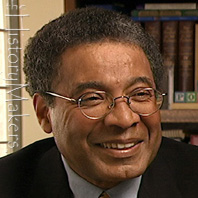
Alvin Poussaint
Professor of Psychiatry, Harvard
"We feel [corporal punishment] is archaic and turns many of them against school... It's important for the black community to realize that the leaders they respect so much are on the record against corporal punishment in schools. "
Read more

Andrew Murray
Senator for Western Australia
Read Senator Murray's Wounds that will not heal.
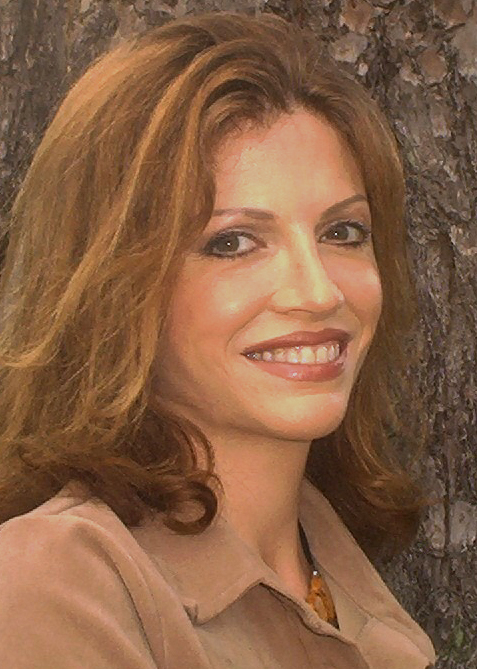
Dr. Teresa Whitehurst
DON'T PLAY WITH FIRE! -- "This violence poses as discipline but is in reality assault with a deadly weapon, and would merit a prison term for any school employee caught hitting any person over the age of consent with the very same wooden board." Read Teresa Whitehurst's letter to Brownwood (Texas) Independent School District.
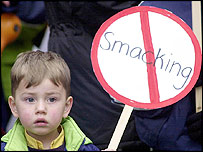
"Children worldwide have the right to be brought up free from fear of physical abuse, psychological harm, or loss of dignity, and to receive the best health care attainable. There is no excuse for British and American children to number among the exceptions." The Lancet, July 17, 2004.
Read full editorial, It is time to stop putting children second in the UK and USA

SIR WILLIAM UTTING
"...Children are small and fragile. There can be no greater injustice than affording them less protection from assault under the law than that given to bigger and stronger adults. I, and so many others, do not plead a special case for children. We argue simply for equal protection... Some talk of trying to define legally the ways in which children may be hit. What a disreputable idea that is."
Read "A licence to hit children that shames us all ," By Sir William Utting, The Observer, June 20, 2004
EDUCATOR IN NAME AND PRACTICE
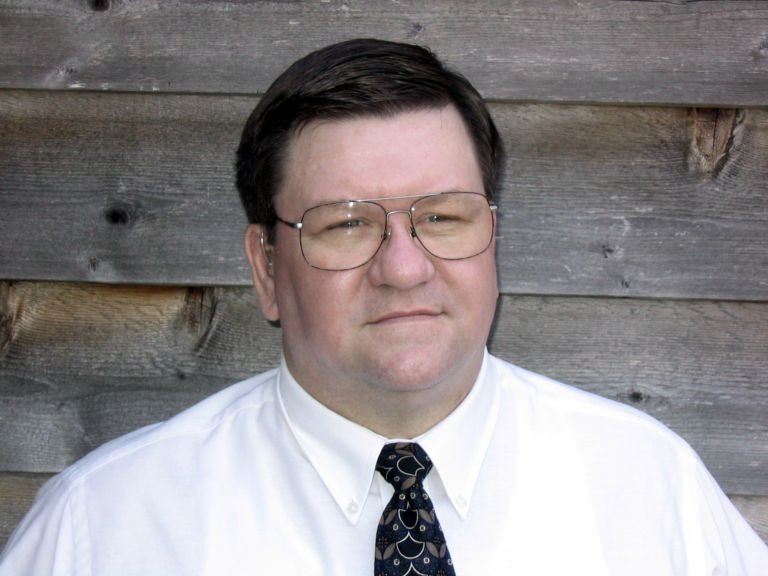
Ralph McLaney refused to paddle students as assistant principal of Carver Middle School in Meridian, Miss.
"The idea of a big white guy hitting an 80-pound black girl because she talked back to the teacher did not sit well with me... I decided I did not get my master's degree in education to spend my time paddling students."
Read the full story, "U.S. Students Still Getting the Paddle -- Corporal Punishment Laws Often Reflect Regional Chasms," by Michael Dobbs, Washington Post, February 21, 2004.
Contact Ralph McLaney at rcmclaney@aol.com
"Parents are the ultimate role models for children. Every word, movement and action has an effect. No other person or outside force has a greater influence on a child than the parent." Bob Keeshan, 1927 - 2004

Read Bob Keeshan's "THE TIME IS NOW"
Criminals are made, not born
Andrew Vachss writes: "... The formula is frighteningly simple: Take child abuse or neglect, especially at the hands of those constituted by the laws of man and nature to protect their own, and let the government either ignore or exacerbate the situation. Time will do the rest.
"The maltreated child cries, 'I hurt!' If we don't listen, and listen quickly, the same cry for help will turn prophetic: The unanswered plea for help will evolve into a deadly pattern. Only a tiny percentage of abused children actually die from their torture, but the survivors are the recruits for an ever-growing army of predatory criminals. Today's victim is tomorrow's predator.
"Does this mean that every abused child will grow into a monster? No. But when the monster does emerge, the fallout is incalculable.
"Look deep into the background of the predatory serial criminal, and the odds are overwhelming that you will find a childhood of abuse. This is explanation, not justification. Not all abused children turn to such destructive paths, and those who do must answer for their acts. It's too late for too many. But if we can't "rehabilitate" monsters, it doesn't mean that we have to stand idly by at their creation.
"We have learned something over the years: Criminals are made, not born -- there is no biogenetic code that produces a violent rapist, a child molester or a serial killer. We also have learned that there are environmental factors that predispose any individual to violent criminality-volatile factors that can tip the scales..."
Excerpt from "Today's Victim Could Be Tomorrow's Predator," by Andrew Vachss, Originally published in Parade Magazine, June 3, 1990. Read this article in its entirety at http://www.vachs s.com/av_dispatches/disp_9006_a.html or on Project NoSpank at nospank.net/vachss.htm
Excerpt from "Banning Corporal Punishment: A Constitutional Analysis, " by Deana A. Pollard, American University Law Review, Volume 52, Number 2, December 2002
America is an extremely violent society relative to other advanced industrialized nations. The government should take action to reduce the rate of societal violence in accordance with scientific research on its origins. Child corporal punishment is associated with elevated levels of societal violence and probably causes aggression and antisocial behavior on the part of the spanked child. As such, the government should ban child corporal punishment as part of a comprehensive effort to reduce societal violence in general.
Banning child corporal punishment would produce additional benefits. Corporal punishment is an unhealthy intrafamilial practice that is a factor in a variety of individual ills, including physical, mental, and emotional disorders. It is also a known precursor to child abuse. Juxtaposed to all of the individual and societal harms associated with child corporal punishment is substantial research -- conducted by both proponents and opponents of corporal punishment -- that child corporal punishment is not effective, or no more effective, than other forms of punishment that do not carry the risks associated with corporal punishment . Therefore, child corporal punishment is unnecessary, of questionable efficacy, and risky.
The research findings on corporal punishment have led to a rapidly growing worldwide trend to ban the child-rearing practice altogether. It is time for America to join this trend and take action to protect children, their parents, and society at large from the harms associated with child corporal punishment.
Readers interested in reading Deana A. Pollard's 46-page "Banning Corporal Punishment: A Constitutional Analysis" in its entirety will find it in The American University Law Review at www.wcl.american.edu/journal/lawrev/52/Pollard.pdf
Statement of the Constitutional Court of South Africa, 1995
"One would have thought that it is precisely because a juvenile is of a more impressionable and sensitive nature that he should be protected from experiences which may cause him to be coarsened and hardened. If the State, as role model par excellence, treats the weakest and most vulnerable among us in a manner which diminishes rather than enhances their self-esteem and human dignity, the danger increases that their regard for a culture of decency and respect for the rights of others will be diminished."
"I am a survivor of a concentration camp. My eyes saw what no man should witness: Gas chambers built by learned engineers, children poisoned by educated physicians, infants killed by trained nurses. Women and babies shot and buried by high school and college graduates. So, I am suspicious of education.
My request is:
Help your students become human. Your efforts should never produce learned monsters, skilled psychopaths, educated Eichmans. Reading, writing, and arithmetic are important only if they serve to make our children more humane."
Haim Ginott (1922-1973), school principal, psychologist, author
"No man treats a motorcar as foolishly as he treats another human being. When the car will not go, he does not attribute its annoying behavior to sin; he does not say, "You are a wicked motorcar, and I shall not give you any more petrol until you go." He attempts to find out what is wrong and set it right. An analogous way of treating human beings is, however, considered to be contrary to the truths of holy religion. And this applies even in the treatment of little children. Many children have bad habits which are perpetuated by punishment but will probably pass away of themselves if left unnoticed. Nevertheless, nurses, with very few exceptions, consider it right to inflict punishment, although by doing so they run the risk of causing insanity. When insanity has been caused it is cited in courts of law as proof of the harmfulness of the habit, not of the punishment."
Bertrand Russell, Has Religion Made Useful Contributions to Civilization? (1930)
When 61/2-year-old Sierra, Jordan Riak's granddaughter, saw the photo in his office of the Kentucky school principal holding his paddle, she said the following, then drew the accompanying illustration:
"Let's not call him a stupid man and just throw him out. Let's just call him a man who doesn't know very well and teach him. Grandpa? Can you give me a piece of paper so I can write a book about the nospank? Hey, I have a good idea - a picture book for no spanking. It saves us a lot of writing."
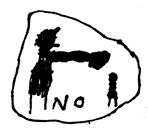
Editorial: End this abuse. Smacking children is always wrong The Guardian (U.K.), May 3, 2003
As we report today, the Government wants to make it illegal throughout the United Kingdom for childminders to smack children in their care. The antiquated defence of 'reasonable chastisement' will no longer be admissible - except for parents. We welcome the belated recognition that this 140-year-old justification for hitting young children has left Britain with one of the worst child-cruelty records in Europe and has offered carte blanche to sadists and abusers. But it is feeble of the Government not to take the argument to its logical conclusion and outlaw the hitting of children by anyone.
Social workers and police have long complained that the 'reasonable chastisement' defence prevents them from intervening in cases of parental abuse, from which, shockingly, one child a week still dies in the UK. In Sweden, in the 10 years following a ban on smacking, not a single child died as a result of parental physical abuse.
Striking other adults (whether 'reasonable chastisement' or not) is unlawful. Why then do we persist in finding it acceptable to visit violence on children? It is time for an outright ban. Hitting children is never right.
These are the realities that most of us remain eager to deny... So long as children are beaten by adults, the obsessions with domination and submission, with power and authority, with shame and humiliation, with painful pleasure all hallmarks of sadomasochism will remain an enduring consequence of the ordinary violence and coercion done in the name of discipline... Sadomasochism is not an aberration; it is inherent in corporal punishment...
Philip Greven, professor of history. Spare the Child (1990)
In many cases, the avowed disciplinary value of flagellation in schools and colleges was a mere pretense to enable sadists to secure sexual titillation.
George Ryley Scott, historian, sociologist, anthropologist. The History of Corporal Punishment (1938)
Sexual predators who victimize children have a friend in Judge Parker. Thank God someone has decided to make an issue of a weird ruling.... Read more at www.nospank.net/n-k19.htm.
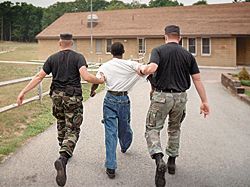
"...Give into the power of the teacher the fewest possible coercive measures, so that the only source of the pupil's respect for the teacher is the human and intellectual qualities of the latter...
Albert Einstein (Out of My Later Years, 1950. p. 33).
Excerpt from an editorial, The New York Times, January 22, 1871
Quintilian, circa 95 A.D.
Children throughout history have arguably been more vital, more gentle, more
joyous, more trustful, more curious, more courageous and more innovative than
adults. Yet adults throughout history have routinely called little children
"beasts," "sinful," "greedy," "arrogant," "lumps of flesh," "vile,"
"polluted," "enemies," "vipers" and "infant fiends." Although it is
extraordinarily difficult to believe, parents until relatively recently have
been so frightened of and have so hated their newborn infants that they have
killed them by the billions, routinely sent them out to extremely neglectful
wetnurses, tied them up tightly in swaddling bandages lest they be
overpowered by them, starved, mutilated, raped, neglected and beat them so
badly that prior to modern times I have not been able to find evidence of a
single parent who would not today be put in jail for child abuse.
The evolution of culture is ultimately determined by the amount of love, understanding and freedom
experienced by its children. Every abandonment, every betrayal, every hateful act towards children
returns tenfold a few decades later upon the historical stage,
while every empathic act that helps a child become
what he or she wants to become, every expression of love toward children heals society
and moves it in unexpected, wondrous new directions.
Lloyd deMause, Dec. 2002
I think that hitting children is barbaric. I am 16 and I just
watched John Walsh's show on when schools cross the line. My school does
not use corporal punishment and neither do my parents (and they have 4
children), and we get along very well, thank you. It is hypocritical for
people to teach children that it is wrong to fight, hit or kick and then
use those methods as a punishment. I am outraged that corporal punishment
is still legal in some states!! Nothing gives a person a right to abuse a
child, and that is what this is, abuse. The sooner some people realize
this, the better, because they are beating the future. I would like to thank
you for this web site, John Walsh for his insightful show and any other
people who speak out against this terrible act.
By D______
Where did we go wrong? We did not spank or hit our sons when they were children, and they turned out to be independent thinkers, strongly ethical, academically successful. They never had the need to do strange things to their appearances to gain attention, never took drugs, did not abuse alcohol. We used reasoning and listened carefully to what they had to say, and purposely fostered their individuality and minds by giving them whatever books or toys or experiences they needed to pursue their interests. We continue to spend lots of time with them. This is not to say that we didn't make mistakes, or wouldn't do some things differently were it possible to turn the clock back and rear our children all over again. But we avoided running into the buzz-saws that many families do because they fail to put love and respect for the individual first.
Suzanne Gorenfeld, 10/27/02
. . . Yet such is the temper and moral culture of teachers themselves that it is exceedingly unsafe to leave too wide a discretion in their hands. The nature even of instructors of youth is fallible, and there is a kind of intoxication in the exercise of unlimited power, though it be only over little boys and girls, that it may wisely be checked and controlled.
. . . And if we do not take more care of the character of the teachers and instructors we choose, I blush to think how shamefully such contemptible fellows will misuse their rights.
November 27, 2002
My name is Tom Johnson. I'm a member of Parents and Teachers Against Violence in Education, who originally created these fliers that have been circulating. I'm also a member of Tennesseans for Nonviolent School Discipline based in Nashville.
I appreciate this chance to address the board. I'd also like to thank Commissioner Jobe for her willingness to raise this important though not very popular concern. I only have time to make a few key points, although I do have information packets for anyone who wants to learn more.
First, about the flier, let me explain that the caption is actually a paraphrase of statements made by Lady Wooten to Parliament back before England banned school corporal punishment. She said, "I find it anomalous that a law which forbids adults to assault one another should give less, rather than more, protection to children...In this country at the present time, the only people who can wield a cane with impunity are teachers and prostitutes."
Now I think everyone agrees teaching is a much nobler profession than prostitution, but with all due respect, this doesn't mean everything educators do is noble, or even appropriate. In fact, it's because they have such an elevated role that their standards of conduct must steer clear of unseemly practices--which brings us to the question of paddling.
Memphis Board of Education policy #5147, section 3, item 10, defines sexual battery as "making contact with sexual private areas" I don't think anyone will dispute that the buttocks qualify as a sexual private area, or that paddling makes intensive contact with that area. Just because it's painful contact against someone who was caught smoking on campus doesn't make it less of a violation.
A number of schools, in fact, have guidelines that specifically identify "spanking" as a form of sexual harassment. Paddling, of course, is a type of severe spanking by a non-relative from which sexually mature teens are not exempt--even if they're legal adults.
A Maryland lawyer got in trouble when it came out he was spanking his 17-year-old secretary for making mistakes, as an alternative to firing or suspending her. But if it's OK for her principal to spank her at school to improve her behavior, then why not her boss at work? Young women don't need these mixed messages if they're going to be confident of their right not to be touched in certain places by men in authority.
School paddling also violates Title IX because girls and boys are impacted differently. Unlike boys, girls who are maturing would have to reveal intimate personal information in order to avoid the chance of this punishment being unfairly compounded by menstrual discomfort. That's assuming the school even makes allowances for that.
Some may recall the TV show "Boston Public" had an episode about a teacher who likes paddling students just a little too much. While it may be only a small percentage of teachers who are like that, just as it's a small percentage of priests who are pedophiles, shouldn't there at least be precautions, some kind of screening process? A teacher in Alabama was part of a child spanking pornography ring busted last March. It was only by luck that he wasn't designated to paddle kids where he taught. We shouldn't depend on luck, though, considering what's at stake.
I'll close with this statement from a 1980 report by the British Psychological Society:
"Advocates of corporal punishment in schools should examine very carefully the weight of evidence now available and, particularly in light of the pornographic component, consider whether they can justify the continuation of a system with such a capacity for exciting unhealthy interest."
Thank you.
A Letter to the Houston Chronicle in response to the l0-01-02 Editorial, "If only publicizing child abuse cases could stop abuse"
October 1, 2002
Dear Editor:
We can hardly afford the luxury of righteous indignation over the mom who pummeled her daughter in the store parking lot or over the stun gun-packing dad. No matter how ignorant or misguided they may be, they were, after all, faithfully following the lead of professional educators who, in 23 states, under color of law, routinely punish schoolchildren by "paddling" them. In fact, it could be argued that beating a child on the buttocks with a flat wooden board is demonstrably more dangerous than what the above-mentioned parents had done. If anything is a true green light for dangerous stupidity, it's corporal punishment in the schools. Until society, through its laws, judicial decisions and educational practices, owns up to its responsibility to extend to its youngest, most vulnerable members the same level of legal protection against assault and battery that applies to every other class of citizen, we're on shaky moral ground when we point an accusatory finger at abusive parents.
Sincerely,
Jordan Riak, Exec. Dir., Parents and Teachers Against Violence in Education
See the editorial.
The Origin and True Purpose of the 'Paddle'
" Human ingenuity gets over most difficulties... And human ingenuity is not necessarily devoted to just or humane ends. It is just as often directed to cruel, disgraceful, revolting and disgusting purposes. With the slave-owners it was directed to the finding of a method of punishing the negroes without affecting adversely their market value. It was to an enterprising Virginian "white" that came the big idea whereby it was possible to "whip" or beat a negro into insensibility without leaving any traces of the owner's handiwork. To this end, he devised a thin wooden 'paddle' punctured all over its flat surface with small holes. With this instrument, so it was said, a slave could be given such terrible punishment that he lost consciousness, and yet no lacerations, fissures, or other signs of punishment having been inflicted, would result..."
Source: George Ryley Scott, The History of Corporal Punishment
QUINTILIAN c. 35-95 A.D.
"So strong is custom
formed in early years"
"I disapprove of flogging, although it is the regular custom... because in the first place it is a disgraceful form of punishment and fit only for slaves, and is in any case an insult, as you will realise if you imagine its infliction at a later age. Secondly if a boy is so insensible to instruction that reproof is useless, he will, like the worst type of slave, merely become hardened to blows... And though you may compel a child with blows, what are you to do with him when he is a young man no longer amenable to such threats and confronted with tasks of far greater difficulty? Moreover when children are beaten, pain or fear frequently have results of which it is not pleasant to speak and which are likely subsequently to be a source of shame, a shame which unnerves and depresses the mind and leads the child to shun and loathe the light. Further if inadequate care is taken in the choices of respectable governors and instructors, I blush to mention the shameful abuse which scoundrels sometimes make of their right to administer corporal punishment or the opportunity not infrequently offered to others by the fear thus caused in the victims. I will not linger on this subject; it is more than enough if I have made my meaning clear. I will content myself with saying that children are helpless and easily victimised, and that therefore no one should be given unlimited power over them."
From Quintilian's Institutes of Oratory (Institutio Oratoria) written in the 1st Century A.D. Translation by H.E. Butler, published by the Harvard University Press in 1936, in the Loeb Classical Library.
"...If we really want to eliminate punitiveness in our society (especially child abuse), we need to convince parents and teachers to use other techniques to shape and change children's behavior. While some would say that children are inherently bad, and that adults have a natural urge to hit children, it is just not true. Attitudes of punitiveness toward children are developed in our own childhoods. These attitudes are shaped by our parents' practices, by our religious beliefs, by national identity, and even by the region in which we live. Despite the powerful effects of modeling, there is convincing research evidence that teachers and parents can break old habits. If we relied in other areas of life on the kinds of nonsensical assumptions used to support corporal punishment, we would still be using leeches to cure diseases and burning witches at the stake. Further, common sense would tell us that a common green mold (penicillin) could have absolutely no relation to promoting health..."
Dr. Irwin A. Hyman, professor of school psychology, Temple University
(Case Against Spanking, 1997)
"Lack of firm discipline does not indicate a need for spanking any more than lack of food indicates a need for corned beef."
Tom Johnson
Healthy human development makes it necessary that a child eventually cut the primary ties which connect him with his father and mother, or with later substitutes in society, and that he become truly independent. He must learn to face the world as an individual. He must learn to find his security not in any symbiotic attachment, but in his capacity to grasp the world intellectually, emotionally, artistically. He must use all his powers to find union with the world, rather than to find security through submission or domination.
Erich Fromm
See Fromm's Forward to A. S. Neill's Summerhill
The Yes Massa Act
The Discipline Act of 2002 (HB 2264) currently being debated in the Tennessee legislature would require each school code of acceptable behavior to dictate that students address school faculty and administration with courtesy titles such as "Mr.", "Mrs.", "Sir", and "Maam" and would allow use of corporal punishment, i.e. striking students in on their buttocks with a piece of wood to enforce the behavior.
Had the authors been more forthright about what was on their minds, they might have called their handiwork the "Yes Massa Act." That would have been the truly appropriate title for a law that permits a person in authority to beat a discourteous subordinate.
This legislation owes nothing to the science of modern pedagogy but has its psychological roots in slavery.
Jordan Riak
What's this Web site really all about? We want to promote upstream solutions so there is a reduced need for downstream crisis management.
To me the worst thing seems to be for a school principally to work with methods of fear, force and artificial authority. Such treatment destroys the sound sentiments, the sincerity and self-confidence of the pupil. It produces the submissive subject. . . It is comparatively simple to keep the school free from this worst of all evils. Give into the power of the teacher the fewest possible coercive measures, so that the only source of the pupil's respect for the teacher is the human and intellectual qualities of the latter. . . .
The most important motive for work in the school and in life is the pleasure in work, pleasure in its result and the knowledge of the value of the result to the community. In the awakening and strengthening of these psychological forces in the young person, I see the most important task given by the school. Such a psychological foundation alone leads to a joyous desire for the highest possessions of humanity: knowledge and artistlike workmanship.
The awakening of these productive psychological powers is certainly less easy than the practice of force or the awakening of personal ambition but is the more valuable for it. The point is to develop the childlike inclination for play and the childlike desire for recognition and to guide the child over to important fields for society; it is that education which in the main is founded upon the desire for successful activity and acknowledgement. If the school succeeds in working successfully from such points of view, it will be highly honored by the rising generation and the tasks given by the school will be submitted to as a sort of gift. I have known children who preferred schooltime to vacation.
Albert Einstein
From the essay "On Education" in Out of My Later
Years, Philosophical Library, Inc., 1950, New York. (pp. 33-35)
"For far too long efforts to understand and treat people with psychotic experiences have been dominated by simplistic and often unsubstantiated biological and genetic theories.
"What we are advocating is a more integrated approach where the horrible life events reported by so many people diagnosed schizophrenic are no longer ignored or inappropriately dismissed as part of their illness.
"It is time to break the silence about how frequently people with psychosis have been abused, whether inside or outside the family."
Dr. John Read
University of Auckland in New Zealand
See "Abuse "triggers brain changes," BBC News, January 14, 2002.
"...What is unjust is bad. So we have to react... To live is not enough. We have to take part in what is good, and do our best... I am so unhappy when I see people who have the duty of pronouncing themselves on injustice, on ugly things, and they stay still and satisfied in their homes. I can't understand that. The participation in good of the world must be general, and everybody has the way of pronouncing himself... Each person has inside a basic decency and goodness. If he listens to it and acts on it, he is giving a great deal of what it is the world needs most. It is not complicated but it takes courage..."
Pablo Casals
From "Conversations with Casals," recorded in 1955 by Jose Marํa Corredor. Pablo Casals (1876-1973), Spanish cellist, conductor, composer, pianist, and humanitarian was one of the most influential musicians of the 20th century.
The adult flagellant fantasy, in short, always derives from the infantile one. As with all sexual perversions, we are dealing with a form of arrested development... and before we can hope to explain the tenacity of the fixation itself we need to examine its roots in childhood... We shall never know how many people have been crushed and rendered impotent by the flogging system... but we can be certain that their name is legion...We can also be certain that the purveyors of flagellant pornography will continue to make a good living at the expense of new victims...
From The English Vice, Ian Gibson (1978)
For more on this subject, see Spanking Can Be Sexual Abuse
"...I never cease to be amazed by the precision with which people often reproduce their parents' behavior, although they have no memory of their own early childhoods. A father will beat his son and humiliate him with sarcastic remarks but not have any memory whatsoever of having been similarly humiliated by his own father. Only in a searching therapeutic context will he (ideally) recall what happened to him at the same age. Merely forgetting early traumas and neglect is no solution. The past always catches up with us, in our relationships with other people and especially with our children... With the help of an enlightened witness, our early emotions will stand revealed, take on meaning for us, and hence be available for us to work on. But without such empathy, without any understanding of the context of a traumatic childhood, our emotions will remain in a chaotic state and will continue to cause us profound, instinctive alarm. By recourse to ideologies of all kinds, we manage to muffle this alarm so effectively that its true origins remain completely obscured... In a bid to blot out the fear and pain of our abused younger self, we erase what we know can help us, fall prey to the seductiveness of sects and cults, fail to see through all kinds of lies, and assert that children need physical 'correction'..."
From Alice Miller's The Truth Will Set You Free: Overcoming Emotional Blindness and Finding Your True Adult Self (2001), pp.124-125.
"...That it is quite easy for terrorists to wipe out tens of thousands of
innocent people to revenge their early traumas is now more evident
than before; that the horrific childrearing of Arab countries-- still
including routine genital mutilation of girls, anal rape of boys and
daily batterings of little children -- is at the basis of the
senseless terrorism is obvious; that paranoia and revenge will become
second nature in America in the near future -- leading to attacking
someone, anyone, even if more thousands of innocent people will die
-- is also probably predictable. But this is not new..."
Lloyd deMause, excerpt from letter to psychohistory@topica.com,
September 13, 2001
"Spanking fills children with anger and the urge to retaliate. But this urge is almost never directly acted upon. Even the most severely spanked children, as a general rule, will not strike back at those who have hurt them. Instead, they are likely to seek relief in fantasy where they can safely vent their anger against make-believe adversaries. Sometimes younger brothers or sisters, or family pets serve this purpose. Popular entertainment also caters to this need.
"As children grow and come under the influence of the prejudices of their community, their anger can be easily channeled toward approved scapegoats. Hate cults and extremist political factions beckon to them with open arms, offering an opportunity to convert fantasy into reality. In every generation, more than a few seize that offer. Their behaviors constitute the worst fallout of the spanking tradition."
Excerpt from Plain Talk about Spanking, Riak, 1992
"What did Dr. Baumrind and her colleague find? They found what they were looking for. They have proven that a known dangerous toxin, if sufficiently diluted, has no measurable ill effects. With this useless discovery they've made headlines, soothed, reassured and emboldened child abusers across the nation, and wreaked havoc with legions of defenseless children. This will not go down in the annals of science as a great breakthrough." Read more at THE BAUMRIND FALLACY
"Children are entitled to care, security and good upbringing. Children are to be treated with respect for their persons and individuality and may not be subjected to corporal punishment or other humiliating treatment."
SOURCE: Parent and Guardianship Code, Sweden, 1979
"A child shall be brought up in the spirit of understanding, security and love. He shall not be subdued, corporally punished or otherwise humiliated. His growth towards independence, responsibility and adulthood shall be encouraged, supported and assisted."
SOURCE: Finland's Child Custody and Right of Access Act, 1983
Ever wonder why schools that paddle usually fabricate their own instruments of pain in the school wood shop? The only alternative commercial sources are retailers of religious books and materials - buying from them could raise church-state separation issues - and dealers in pornography and S/M paraphernalia.
Jordan Riak
"...The link between smacking and sexuality is too strong in history, in biography, in fact, for anyone to feel in any way comfortable about the practice of beating adolescent boys. Given the general randiness of puberty the chances of the beating occurring during a state of sexual arousal are probably quite high. Once the link is forged it may be generalized till biting, beating up and other inflictions become habitual in sexual activity. The teacher may well have no knowledge at all of any possible links between punishment and sexuality in the past history of the child, no knowledge of the present state of sexual arousal and might well stand in fear of unconscious aspects of his own motivation... Time and time again in case histories of psychopathology of a sado-masochistic kind one finds explicit origins in adolescent punishments. This is a risk that is run each time a boy is beaten at high school...However low the probability, are these risks wrth taking?..."
Jane and James Ritchie, excerpt, Spare the Rod, 1981
Boot camps "...of this type operate outside government
oversight; they occupy a 'black hole' in our state's
regulatory scheme - and that's wrong. I will not have the state of Arizona be a haven for
unscrupulous or abusive people who prey on desperate
parents and their children.''
See complete article
Gov. Jane Hull, Ariz., July 21, 2001
"...Hitting, slapping, or spanking children as punishment shows them that it's okay to hit others to solve problems and can train them to punish others in the same way they were punished. Physical punishments stop unwanted behavior only for a short time. Even with very harsh punishment, children may adapt so that it has little or no effect. Using even more punishment is equally ineffective.
Nonphysical methods of discipline help children deal with their emotions and teach them nonviolent ways to solve problems..."
Excerpt from "Teaching the Basics of Violence Prevention," a publication of American Academy of Pediatrics
Schools have no business meting out punishments on children that society has deemed too barbaric for use in prisons or the military. The case you profiled in a May 3 [New York Times] front-page article is a perfect example of why corporal punishment should be outlawed in the 23 states that still allow it. The paddling of a child to the point of being bruised and fearful of returning to school illustrates the lack of control that states have over their schools' disciplinary practices.
Americans are striving to teach children not to use violence to solve problems, not to bully others, and to respect themselves and other people. I don't see how children can learn these lessons when the very people who give them guidance their teachers and principals are leaving them bruised and battered.
Steve Berman, M.D., President of the American Academy of Pediatrics, letter to the Editor of The New York Times, May 9, 2001. Published May 12, 2001.
"It's ironic: Only those over 18 can legally buy spanking porn, but only those under 18 can be forced to submit to the real thing."
Tom Johnson, (Author of The Sexual Dangers of Spanking Children)
"...Adah Maurer remembers another principal who frankly admitted he kept three different size paddles on hand. Depending on the social status of the child -- not the severity of the infraction -- the principal selected and applied the paddle of his choice.
The heavy wooden paddle he called 'Mister Charlie' was reserved strictly for the backsides of boys from the slums.
The middle-sized ping-pong paddle was used on middle-class kids.
And "Popsicle Pete" which was nothing more that tongue depressor a physician might use, was reserved for children of the affluent.
'I was amazed,' Maurer recalls. She says she finally asked him: 'How do you justify this kind of preferential treatment of children?'
'I try to go along with parents' preferences,' he replied..."
The Berkeley Paper, June 11, 1974
"...In Dallas, a high school senior with a good academic record, an A in conduct all the way through school, and the kind of self-discipline that made it possible for him to hold down a job while going to school was told that he would not be allowed to graduate with his class unless he consented to be struck three times for violation of a school parking regulation.
He agonized over the decision for a long time, since he considered such a beating a violation of his integrity, a violation of his spirit. His mother, morally opposed to corporal punishment, supported her son to the point of asking that the blows be administered to her instead.
The school authorities would not consider, nor would they accept a three-day suspension of the boy as an alternative punishment. The young man finally agreed to be beaten..."
Nat Hentoff, "Corporal Punishment: A Lesson in Democracy," Civil Liberties, No. 281, November 1971
"In more primitive times, when the birth rate was astronomical and the death rate was almost as high, damaged children could be tolerated or destroyed. Now that fewer children are born, and infanticide is considered murder, civilization, with its proliferation of intricate technology, will soon have less need for strong backs with dull minds, or even sharp minds with sadistic quirks or paranoid compulsions. The need now is for physically and mentally healthy individuals who are free to think logically, innovate, enjoy nature's bounty without leaving poisonous residues behind, and share this earth and the heavens around without killing each other over it. To this end, every child that is born must be a wanted child, loved and nurtured... In such a time, and it is not very far into the future, there will be no place on this earth for violence against the next generation."
Adah Maurer, Ph.D.
"...It is well known that corporal punishment may lead to a pathological displacement of erotic impulses. The new psychology suggests that masochistic tendencies may already be found in children. By this term is to be understood the phenomenon that some people derive sexual pleasure from pain, that they like to be given by others, and especially by those they love. If this perverse erotic tendency is established, it may in later years lead to severe mental disturbances and tragic inhibitions which may continue throughout life. One should not exaggerate these dangers, but they exist nevertheless, and there are a great many more persons who suffer from masochistic sexual difficulties than the lay public is commonly aware..."
Willi Schohaus, The Dark Places in Education, 1932
"...That all social violence--whether by war, revolution or economic exploitation--is ultimately a consequence of child abuse should not surprise us. The propensity to reinflict childhood trauma upon others as an adult in socially-approved violence is actually far more able to explain and predict the actual outbreak of wars than the usual economic motivations, and we are likely to continue to undergo our periodic sacrificial rituals of war if the infliction of childhood trauma continues. The human race is now quite able technologically to satisfy its needs if we can live together without violence toward each other. But unless we employ our social resources toward consciously assisting the evolution of childrearing, we will be doomed to the periodic destruction of our resources, both material and human... We cannot be content to only continue to do endless repair work on damaged adults, with our therapies and jails and political movements. Our task now must in addition be to create an entirely new profession of "child helpers" who can reach out to every new child born on earth and help its parents give it love and independence..."
Lloyd deMause, From "The History of Child Abuse," speech to the American Psychiatric Association Convention in Philadelphia, August 1994.
"... Slavish discipline makes a slavish temper... If severity carry'd to the highest pitch does prevail, and works a cure upon the present unruly distemper, it often brings in the room of it a worse and more dangerous disease, by breaking the mind; and then, in the place of a disorderly young fellow, you have a low spirited moap'd creature, who, however with his unnatural sobriety he may please silly people, who commend tame unactive children, because they make no noise, nor give them any trouble; yet at last, will probably prove as uncomfortable a thing to his friends, as he will be all his life an useless thing to himself and others... Beating them, and all other sorts of slavish and corporal punishments, are not the discipline fit to be used in the education of those we would have wise, good, and ingenuous men...
John Locke (1632-1704) Excerpt: "Some Thoughts Concerning Education," 1692
"Schools are often perceived by parents as bearers of cultural norms concerning proper child rearing practices and discipline. Hence, when schools and other child care settings employ practices not conducive to optimal development, e.g. corporal punishment and other demeaning and threatening, negative disciplinary measures, they convey a subtle message to parents, namely that such measures are appropriate, as they are sanctioned by educational authorities and 'experts'."
David G. Gil, Professor of Social Policy, Brandeis University
May 12, 2001
Spare the Child
To the Editor of The New York Times
Re "Breaking the Hickory Stick" (editorial, May 7):
Schools have no business meting out punishments on children that society has
deemed too barbaric for use in prisons or the military. The case you profiled in a
May 3 front- page article is a perfect example of why corporal punishment should
be outlawed in the 23 states that still allow it. The paddling of a child to the point of
being bruised and fearful of returning to school illustrates the lack of control that
states have over their schools' disciplinary practices.
Americans are striving to teach children not to use violence to solve problems, not to bully others, and to respect themselves and other people. I don't see how children can learn these lessons when the very people who give them guidance their teachers and principals are leaving them bruised and battered.
Steve Berman, M.D.
President of American Academy of Pediatrics
Elk Grove Village, Ill., May 9, 2001
|
HAVE YOU BEEN TO THE NEWSROOM? CLICK HERE! |